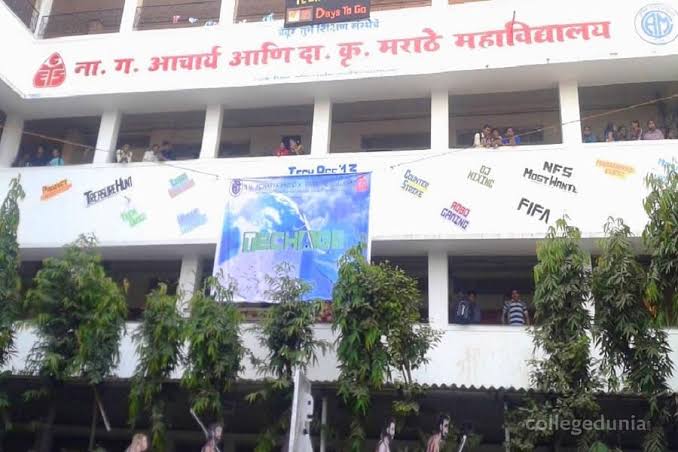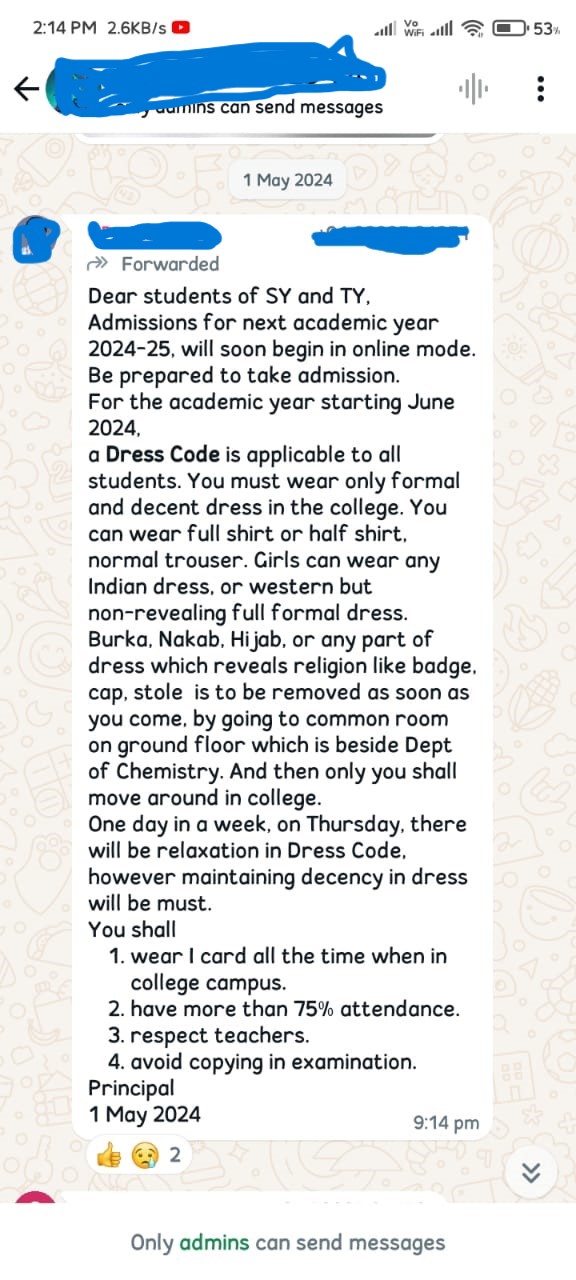Hijab Ban at Chembur College in Maharashtra: Girls Asked to Wear ‘Non-revealing’ Dress, But Not Veil, Headscarves

Shahzeen Khan, TwoCircles.net
Mumbai: “If the college implements a change in the dress code, I might have to withdraw my admission,” said Parveen (name changed), a 20-year-old student at Acharya Marathe College at Chembur in Maharashtra, reacting to the new rules, disallowing students to wear “religious attire” on the campus.
As per the latest regulations, the students, who are pursuing bachelors, will have to remove their “religious attire” (hijab or headscarf or a veil to be precise) in a designated common room before attending classes or moving around the campus.
This dress code will be implemented from June, a year after a similar uniform policy was enforced by the institution for junior students.
“I will get myself admitted to another college, which is 15 kilometres away from home, but I will not change my clothing,” she said.
Though the college has not officially released any circular in this regard, the new guidelines have been circulating in different WhatsApp groups of the students.
The message on WhatsApp groups states, “Dear students, starting June 2024, a dress code will be enforced for all students. You must wear only formal and decent attire while in college. Full shirts or half shirts, normal trousers and any Indian or Western dress that is non-revealing and full formal are allowed for girls. However, you must remove any clothing or accessories that reveal religion, such as burkas, niqabs, hijabs, badges, caps or stoles, as soon as you arrive by going to the common room on the ground floor next to the Department of Chemistry. Only then can you move around the college. On Thursdays, there will be some relaxation in the dress code, but maintaining decency in dress remains a requirement.”
The guideline has been issued by the principal and shared in WhatsApp groups by respective class managers, said a student on the condition of anonymity.

She said the timing of the announcement is “strategic” as most of the students are at home because of vacations and no classes taking place.
“The time has been strategically chosen to ensure no there is no protest on the campus against the decision. Furthermore, the rules have been communicated to us only through WhatsApp so that if the management has to withdraw it in view of potential agitation, our protest can be described as baseless and based on rumours,” she said.
Interestingly, the group settings were allegedly changed before the message was sent. “Previously, students could reply to conversations in the groups, but right before the new dress code was shared, the group settings were changed to admin only,” revealed another student.When she tried to contact the principal to discuss the matter with her parents, the person responded dismissively, saying, “Neither waste my time nor your parents’. Nothing will change. We are sticking to the decision.”
Commenting on the “irrationality” behind the decision, Ateeq Ahmad, an educator from the city, called out the “hypocrisy” of the decision-makers. “What decency are they trying to imply? Do they only have issues with Muslim attire? This is clear prejudice against Muslims. Who else would make such hypocritical rules? They demand non-revealing clothes but reject the burqa (veil). They want decent clothes, but not the burqa. Moral precepts may differ from person to person. And why is there a relaxation on Thursday? How will this improve things for the students?” he posed a battery of questions.
He said they don’t understand the true intentions of the authorities. “This will only discourage Muslim students from attending schools and colleges. Perhaps, that is their hidden motive,” he speculated.He said they have written to the human rights and minority commissions on behalf of the students. But the authorities remain steadfast in their decision.
The new rules seemingly violate Article 25 of the Constitution, which guarantees a person the freedom of conscience and the right to freely profess, practice and propagate his or her religion.
Last year, there was a similar ban on hijab for senior secondary students that seem to have been degree college students as well.As stated by Subodh Acharya, the general secretary of the college’s governing council and a Shiv Sena (UBT) leader, the reason behind the policy change is to increase college placements.
“Our students come from poor family backgrounds. I want them to have a good reputation in society,” he said when asked why the college felt the need to ban religious attire when other degree colleges in the city do not have such restrictions.
“Students should learn values and etiquette — how to live and behave in society. If they seek jobs while wearing the burqa, will they be considered?” he asked.
Nitizens are criticizing the decision, calling Acharya’s remarks as “communal” and “classist”. One final year student pointed out that many students who go to college do not wish to participate in placements. “They simply want to get a degree and be self-employed. Moreover, women can work while wearing religious attire,” she said.
Saif Alam, counsel to an aggrieved student, said, “The decision to impose a uniform dress code on university-going students is completely baseless and filled with prejudice.”Why does the college think it needs to impose a dress code on students from poor families, he asked, claiming that the decision is influenced by “a classist mentality”.
“Maharashtra had reformers like Fatima Shaikh and Savitribai Phule, who fought for women’s education. These cowardly steps by the college have brought shame upon us all and will only discourage female Muslim students from pursuing higher education,” said Alam.
Another student, Ayesha, a resident of Shivaji Nagar, said, “Most of the students in my class are Muslims. When the college introduced uniform dress code, we agreed to wear them. Our parents only had one request: headscarves must be allowed.”She further pointed out many students in the college come from the Govandi and Shivaji Nagar slums, where a significant number of Muslims reside. “If these students are not allowed to wear burqas, many may be forced to discontinue their education.”
The college is the closest option for slum dwellers to pursue bachelors.
When asked if wearing hijab or naqab has hindered their education or learning abilities, a student responded, “We have never encountered such prejudice from school administrators before. Our teachers recognize us by our names and voices. We always carry identification cards with us. During exams, we wore naqabs and headscarves, and there were no objections. If a teacher had any suspicion about a student during the exam, he/she can check the student, and we all cooperate.”She said there was no need for a complete ban on hijab as it does not violate anyone’s right to education. “We have been able to pursue our education without any challenges,” she said.
She said a similar notice was issued on May 16, 2024 that was vehemently opposed by students. Following the protest, it was amended and the terms “hijab” and “naqab” were removed. “But it continued to mention that religiously symbolic clothing was forbidden, which confused the students even more. We have no idea what will happen when we go to the college from the next session. We are afraid that we will be able to complete our degree?”
Saif Alam, who is representing many students, said he will continue to fight the decision in court of law till authorities withdraw the decision.
College Principal Vidya Gauri has defended the dress code policy, stating that it was implemented to ensure “uniformity” and “prevent discrimination based on caste, religion or class”.
It is worth noting that a similar ban on hijab in Karnataka colleges had caused controversy last year, leading to protests across the country. The matter ultimately reached the Supreme Court, which delivered a split verdict on whether Muslim students should shed their hijab.